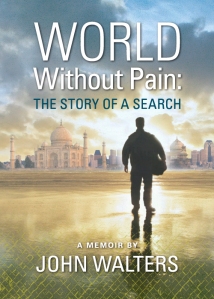Before I talk about this book I want to explain to you how I’ve been making money lately. Unfortunately, my novels, short stories, and memoirs do not yet pay a sufficient amount of the bills. In addition, nobody is falling all over themselves to hire someone who just arrived back in the States after living in Asia and Europe for the past thirty-five years, is almost sixty years old, and has no university degree. I thought I would be able to teach English as a second language. There is a constant call for English teachers here in San Diego. Yet despite the fact that I have sixteen years of experience teaching teens and adults to prepare for just about every English language test in existence, despite my impressive references, door after door was slammed shut in my face. They liked my experience and references, yes, but they weren’t willing to consider anyone without a Bachelor’s Degree, period. It might be a Bachelor’s Degree in shit-shoveling from Podunk University and the person might not know a damn thing about English teaching, but that person would get the job before me. Why? The lack of a piece of paper. Absolutely nothing to do with ability. It pisses me off, can you tell? Reminds me of what someone named Jesus once said about “straining at a gnat and swallowing a camel”. Well. Don’t get me started.
Anyway, I have been working at a website on which writing jobs are posted. There are all sorts of jobs writing articles and taking surveys for which the pay is a miserable few cents to a few bucks. To access the higher-paying jobs you have to pass a writing test. I passed the test in short order but had to wait a few weeks for my approval to come through. In the meantime I took surveys and so on, but you can’t survive on work that pays that low. Once I could choose the higher-paying jobs I started writing four to six articles a day on diverse subjects for internet blogs. It’s still for low pay, but I can buy groceries and take care of bills. I mention this because I was able to apply for this job, take the test, and access the work all on the internet without even leaving my home. Anyone can do it: stay-at-home moms or dads, the physically challenged, or bright old folks like me who nobody seems to want to hire anymore.
The book in question, “The World is Flat”, is about globalization and how it has affected our world. It was written back in 2005 and it is a bit dated in parts. It can still be insightful, though, if it is taken as a fascinating piece of history, an analysis of how we got where we are.
The best part of the book is the beginning, in which Friedman lists and explains what he calls “the ten forces that flattened the world”. Briefly, these are: the fall of the Berlin Wall and the opening up of the communist world, and the birth of the Windows operating system (this all happening concurrently); Netscape going public and the overinvestment in fiber-optic cable; the appearance of work-flow software that could connect applications; open-sourcing collaboration for projects such as Apache web server and Wikipedia; the ability to outsource work to countries such as India, Russia, and China; the ability to offshore physical work to countries where it could be done more cheaply and easily; international supply-chaining for large companies; in-sourcing, or turning over internal work to companies who could run it for you and do it better; easily available information due to Google, Yahoo, and other web-searching programs; and personal gadgets such as laptop computers, cell phones, and other devices which bring all this technology within everyone’s reach. Friedman’s explanations of all these phenomena are fascinating, and I found myself over and over tracing what happened a decade or more ago up to what is currently going on in the online world. The world is flat, says Friedman, because all of these things have opened the peoples of the world up to each other, and have given them the ability to collaborate and innovate as never before.
In the second part of the book Friedman traces how these flattening influences have affected the United States, the developing world, international business, and geopolitics. Alas, the book slows down here, and this is where it becomes somewhat dated. Some of the author’s analyses are spot-on and insightful, others are – well, opinionated – that is, not so much based on historical trends as the first part, but instead one man’s ideas of how it will all play out. A lot of shit has hit the fan and water has flowed under the bridge since 2005. Because of these flattening influences Friedman describes the world continues to evolve. At the end, the author divides the world into two camps: those countries in which the flattening of the world has spurred development and opportunity; and those countries which have rejected innovation and turned inward and conservative and reactionary. This trend of opposing camps continues to the present date.
I end by recommending the book, but with reservations. The first part, about the forces that flattened the world, I would recommend as-is as a fascinating history of how the flat world came about. In the second part, however, some sections are still relevant and some are not. Because the book contains a lot of useful insight I would say that a second edition is necessary; redundant parts could be cut, and new sections could be added. Then again, if I were Friedman I wouldn’t bother; I’d just write another book. Perhaps that’s what he has in mind as well.
I’m a professional writer; I make my living by my words. I’m happy to share these essays with you, but at the same time, financial support makes the words possible. If you’d like to become a patron of the arts and support my work, buy a few of my available books or available stories. Thanks!
































